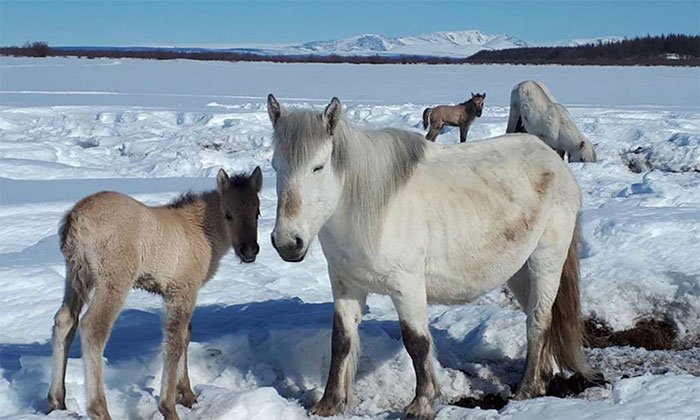Ungulates help maintain permanent ice
The presence of horses, bison or reindeer in the polar regions can slow down the rate of permanent melting, helping to combat climate change.
The permafrost permafrost is melting fast. As a result, bacteria begin to break down organic carbon trapped inside and release large amounts of methane and CO2 into the atmosphere, exacerbating climate change. A new study, published in Scientific Reports on March 17, shows large colonies of hoofed animals may help slow this effect.

Ungulate helps slow down climate change.(Photo. IFL Science)
Experts from the University of Hamburg in Germany conducted experiments on herds of bulls, horses and reindeer at Pleistocene Park in the city of Chersky, northeastern Russia. These ungulates were resettled in the area more than 20 years ago with the purpose of tracking their impact on the permafrost below.
In the winter, the eternal permafrost in Chersky is only maintained at -10 ° C, "warmer" than the upper air temperature (possibly down to -40 ° C). This is because heavy snowfall forms a layer that separates the ground from the air, causing the permafrost at the bottom to have higher temperatures.
The team found that the presence of ungulates will compress and scatter the surface snow. Specifically, for every 100 animals living in an area of 1 km2, the average height of the snow layer will be halved. This significantly reduces its insulation effect and thereby, enhances the permafrost of the permafrost.
Scientists have used a special climate model to simulate processes of temperature change on the ground. The results showed that: if greenhouse gas emissions were not controlled, the ground temperature could rise by 3.8 ° C by 2100, causing half of its permanent ice to melt. However, with the resettlement of ungulates, the ground only heats up an additional 2.1 ° C (less than 44%), helping to maintain 80% of the permafrost.
The team is looking into the potential side effects of the method, for example in the summer, whether these herbivores will destroy the moss and insulation vegetation, leading to increased ground temperatures. or not. In the next phase, they want to work with biologists to find a way to expand the range of Arctic ungulates.
- Video: Two principles that make eternal engines impossible
- American experts warn of 'permanent chemicals' that cause cancer in food
- Germany studies building a permanent waste storage area
- NASA permanent tires: available on all terrain, withstands temperatures of -200 degrees Celsius
- 10 passport sheets can be purchased with the cheapest price
- Video: Body reaction makes tattoo permanent
- Scientists have made permanent chewing gum with customized flavors
- Need more than 200 billion USD to maintain greenhouse gas concentrations
- The extinction of dentures is approaching
- Is smartphone battery just charging once a week?
- Sulfur dioxide helps maintain the flow on Mars
- The US warned of exotic plants, which could cause permanent blindness
 Animal 'suffering' after hibernation
Animal 'suffering' after hibernation Why do goats climb well?
Why do goats climb well? Scientists were surprised to see chimpanzees eating turtles
Scientists were surprised to see chimpanzees eating turtles Giant catfish died deadly due to drought in Thailand
Giant catfish died deadly due to drought in Thailand Terrified frozen land full of laughing gas 'heats' the earth
Terrified frozen land full of laughing gas 'heats' the earth  The 'time bomb' beneath the permafrost
The 'time bomb' beneath the permafrost  Ancient paintings are 'rising from the grave'
Ancient paintings are 'rising from the grave'  The permafrost of the permafrost dissolves earlier than 70 years in shock
The permafrost of the permafrost dissolves earlier than 70 years in shock  Humanity will be threatened if the extremely toxic substance under the Arctic ice layer escapes
Humanity will be threatened if the extremely toxic substance under the Arctic ice layer escapes  Secrets revealed under 'eternal time bomb' in Siberia
Secrets revealed under 'eternal time bomb' in Siberia 